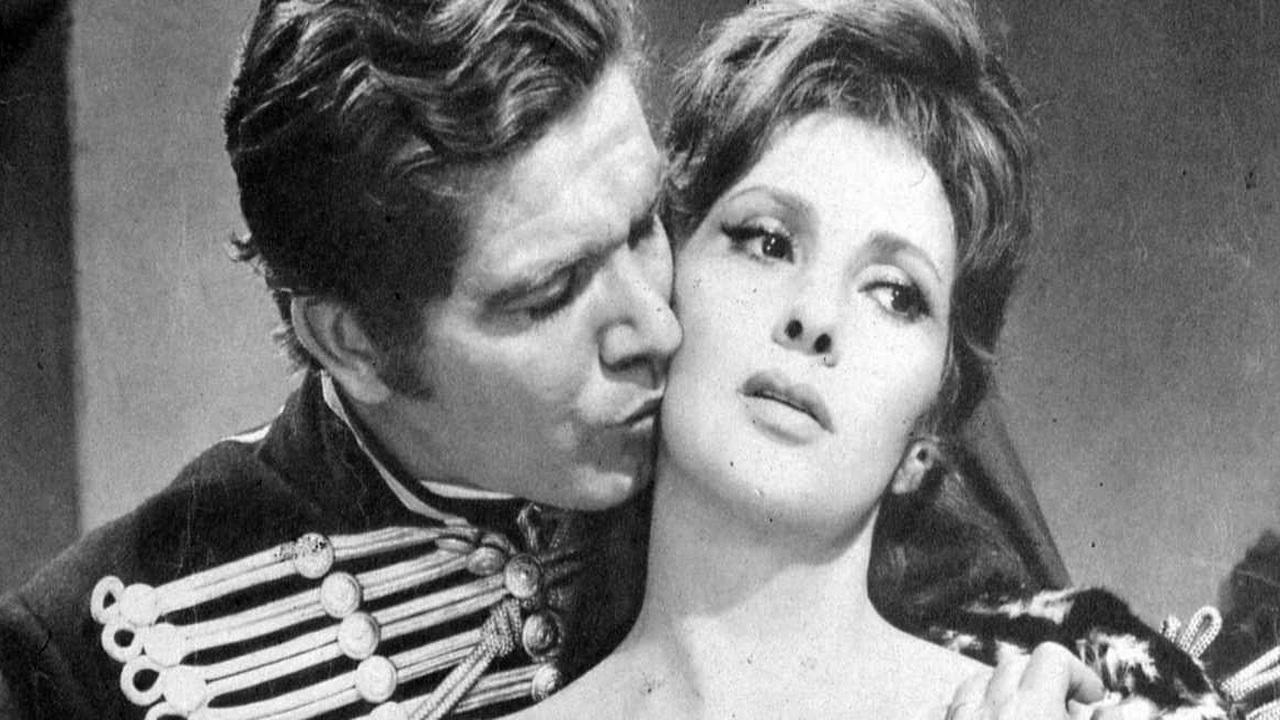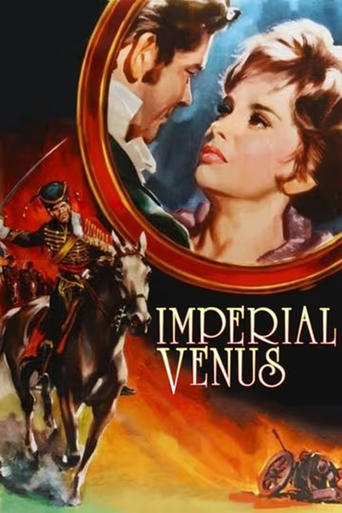

Absolutely brilliant
... View MoreIt really made me laugh, but for some moments I was tearing up because I could relate so much.
... View MoreThis is a small, humorous movie in some ways, but it has a huge heart. What a nice experience.
... View MoreVery good movie overall, highly recommended. Most of the negative reviews don't have any merit and are all pollitically based. Give this movie a chance at least, and it might give you a different perspective.
... View More"Imperial Venus" has three major problems. The most important one is its lack of narrative thrust; the viewer gets the feeling that nothing is happening for most of the running time. The second is the choppy continuity (despite the film's overlength); large sections of the story (what little story there is) and entire time periods appear to be missing. The third problem is the low budget; virtually all of the battles and any other action scenes occur off the screen - what we do get on the screen is 90% talk. To be fair, Gina Lollobrigida and Stephen Boyd make a handsome couple, but this is not the lighthearted romp you might except based on the plot summary, and Gina is deliberately made to look tired and unhappy at times. *1/2 out of 4.
... View MoreGina Lollabrigida headlines as the sister of Napoleon in the huge spectacle of the life and loves of a footnote person in history. This is epic story telling on a grand scale. Unfortunately the story is incredibly dull and probably pointless. I saw this in a version that was shorn of twenty minutes and while it was choppy at times (I sensed something was missing) it was still a tough slog to get through. Sure it looks great as many of the huge color epics do but beyond the look there is nothing. Lollabrigida looks good but really can't act. I was never a fan of hers and knew her more because she was a "star" more than as someone who made films I wanted to see. She's paired with Stephen Boyd, a good but limited actor, who was probably better in his supporting roles. I really can't recommend this unless you're a fan of Gina, of spectacles (regardless of quality) or are in need of sleep.
... View MoreI saw this movie in a German dubbed version, so I can't judge the "original" version (if there was an original soundtrack to the movie, it's more likely that this has been filmed, like the Leone Westerns, where every actor spoke in his native language)! But I did like the German version ...As is obvious from my rating against the "beating" it got before my rating. Now I think most of the reviewers can agree, that the actors did a good job. I also have to agree with the fact, that nothing explicit is shown here (neither sexual nor anything else), but is played with. But the sexual innuendos that are used here, are really great. At least I could enjoy them. Since back then, they couldn't be more free with "topics" like that, I'm even surprised they got away with some of the things in the script. Anyway, the movie has it's downfalls, but I rated the high points (jokes and actors against an incoherent story)!
... View MoreIMPERIAL VENUS (1963) is an elaborate Italian-French co-production which chronicles the exploits of the sister of Napoleon Buonaparte from the time of the dictator's initial conquests to his exile on Elba. As played by Gina Lollobrigida, Paulette (later dubbed Paolina after she marries a Roman prince) is beautiful, willful, impulsive, and not a little promiscuous, yet she remains devoted to her brother through thick and thin, the only family member who doesn't abandon him in his darkest hours. It's well-acted by an international cast and engages our interest because it strips a host of larger-than-life characters down to human scale and invests the drama with passion, emotion and flawed, recognizable behavior.The story begins in Marseille as Napoleon's immediate family--mother, siblings, uncle--are crammed into a small apartment waiting for Napoleon (Raymond Pellegrin) to return from his military victories in Italy. When he returns the group sets about behaving like a typical dysfunctional family. Mother disapproves of Napoleon's marriage to Josephine. Napoleon disapproves of the man Paulette wants to marry and effectively blocks the marriage, inciting the first of many emotional outbursts from Paulette. A pattern soon develops of arranged marriages for Paulette, beginning with General Leclerc (Massimo Girotti), who is sent to quell an uprising on Haiti and meets a tragic end, and then Prince Borghese (Guilio Bosetti) of Rome. All the while, Paulette seeks out a steady stream of affairs with other men, usually military officers. The man she finds herself attracted to early in the film, the charming and gentle Colonel Jules de Canouville (Stephen Boyd), is sent to a distant outpost by the jealous Leclerc, but turns up later on and becomes the last great love of Paulette's life, despite the fierce opposition of Napoleon.The story travels back and forth across Europe and across the Atlantic to the Caribbean, covering a 15-year period, but stays focused on Paulette and her comings and goings. The settings and costumes evoke a sense of dwellings and clothing that are lived in rather than newly created on a movie set. It helps that we see the characters doing everyday things, indulging in small pleasures and suffering pains and sorrows that normal people do. When we see Napoleon, it is usually only in relation to his sister, so the global upheavals that he instigates through his hunger for power take a back seat to the squabbles with his headstrong sibling. He sincerely loves and cares for her, but also wishes to control her. She loves her brother, but wants happiness on her own terms with whomever she wishes. It's a deeply felt but difficult relationship for both of them and it gives the film an intimacy that few historical melodramas of this type achieve.Gina Lollobrigida was one of the most beautiful and voluptuous movie stars of her time, but was also a superb actress. She carries this production on her shoulders and takes the audience through the highs and lows, good times and hard times of a woman who rose well above her station thanks to her family connection and who never bothered to adjust her behavior to the rules and mores of the class she was thrust into. Lollobrigida conveys dissatisfaction with the strictures of life in a palace but also radiates the joy of her moments of happiness, particularly with de Canouville. She only truly develops a sense of responsibility when faced with great adversity as when her husband, General Leclerc, is under siege in Haiti. She displays no fear, but rises to the occasion, visiting wounded soldiers and fever victims in the island hospital, raising the morale of the other French ladies by holding dance classes, and seeking out her husband at the fort he is defending in his hour of need.It's a good-looking Technicolor film with locations throughout Europe and well-appointed, but not ostentatious, sets created at Cinecitta Studios in Rome. The ladies are dressed in an impressive array of attractive gowns that look authentic and not overly showy. The poignant music score by celebrated Italian composer Angelo Francesco Lavagnino veils the proceedings with a sad, romantic aura.The VHS tape screened for this review contains the American television version of the film which runs 121 minutes, 19 minutes shorter than the 140-minute running time that IMDb lists. As a result, the action cuts rapidly from one section of the story to the next, sometimes jumping ahead several years without any appropriate transitions. It was filmed in English, although all the dialogue is post-dubbed, with the English-speaking performers in the cast, including Lollobrigida, dubbing their own lines. The widescreen compositions suffer from the full-screen presentation on the tape viewed. A letter-boxed DVD transfer of a restored print would be a real treat for fans of historical dramas and Italian epics of the 1960s. Unfortunately, such a seemingly old-fashioned genre has yet to find the favor among younger film buffs that other notable Italian genres of the era (sword & sandal, horror, westerns) have at this time.
... View More